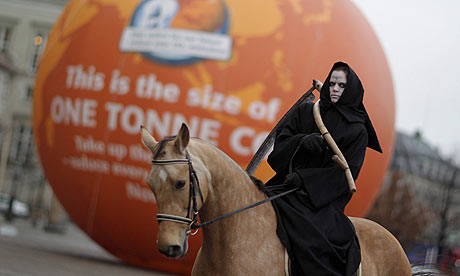
Humanity has always imagined its own destruction. Each generation believes the end is somewhere round the corner, and our catastrophic fantasies are a good barometer of what's currently troubling us. Thousands of years ago, we heard about a flood sent by God to flush out his people in their sinfulness; later, the Book of Revelations forecast all sorts of grisly finales. The truth of imminent calamity was all around us; it was just a case of seeing. The word "apocalypse" derives from the Greek "to uncover".
When science started to replace God, intimations of armageddon remained. It seems that we still believe we require punishment for our wicked overreaching. The typical scenario was a Big Bang followed by the realm of the future medieval – a kind of reversion to pre-industrial society without the structures to keep it in check. Technological progress was thus unmasked as an all-too-brief brief and illusory veil for our inherent barbarism. We weren't always sure how our advances were going to kill us (ideological implosion; chemical catastrophe; cybernetic revolt), but one way or another we were due a damn good purging.
After London (1885) by Richard Jefferies found a world ravaged by unspecified cataclysm. Industrial development was subdued; the land reclaimed by nature. René Barjavel's Ashes, Ashes (1943) censured humanity for its dependence on electricity, when the supply was summarily cut off, with disastrous consequences. As our weapons improved, so did the coherence of our terrible imaginings. In the 19th century, Ignatius Donnelly envisaged "dynamite bullets"; HG Wells predicted the ballistic missile. Then we split the atom and our writers got busy: Pat Frank, Nevil Shute, Andre Norton, Gudrun Pausewang, Philip K Dick and countless others have played with the post-nuclear holocaust scenario to alarming and memorable effect. Outside influences have also remained a threat: alien invasion; global pandemic; meteor impact; random acts of blindness.
Today, of course, the big fear is environmental. And this seems to have had a subtle (or maybe not so subtle) effect on our bards of the apocalypse. Put simply, the difference between the current threat and older ones is this: we are all, personally, to blame. Almost everyone (especially in the well-read west) is doing their bit to make the world a warmer place, and thus we are all implicated in the calamity that will this time surely spell the End. Previously, we could blame naive scientists or tyrant villains, world leaders or fickle fate; and though there is an argument for collective culpability in the Bible (in which case, we've come full circle), it did at least offer us the option of throwing our hands up at a cruel and vengeful God. Now we're all directly responsible and I think the bleakness of recent books reflects this.
Will Self's The Book of Dave is a Swiftian satire in which a waterlogged future London is steeped in malevolent superstition (the people worship the ravings of a former cabbie). Similar themes are present in The Pesthouse by Jim Crace in which the author set out to overturn America's "optimistic narrative". Enlightened rationalism has gone the way of plenty; the downtrodden victims of ecological collapse worship a bizarre and oppressive sect. Pernicious religious fundamentalism is also seen as the answer to impending eco-tragedy in Liz Jensen's The Rapture, in which humanity eventually gets its just deserts. In these three very different books, greater spiritual redemption is seen as a hollow illusion. The moments of warmth are fleeting and individual. The world seems better off without us.
The best contemporary example of post-apocalyptic gloom is Cormac McCarthy's relentlessly despairing and brilliant The Road. Of course, the relationship between father and son is full of beauty. But humanity's redemption is ultimately slight – certainly on a macro level. We've screwed it, says McCarthy. Irreparably. And this realisation knocks us for six. It is part of what makes the book so powerful.
The Road may have its precursors; but I wonder if the feeling we get from engaging with its message is rather more unique to what is happening today. Has the timbre of contemporary guilt informed the fiction now being produced? And does it change the way in which we reread the apocalyptic writing of the past? The era of decadent consumption is also an era of private culpability. Are we, then, even more willing than historically to use our literature as a tool for collective punishment?

